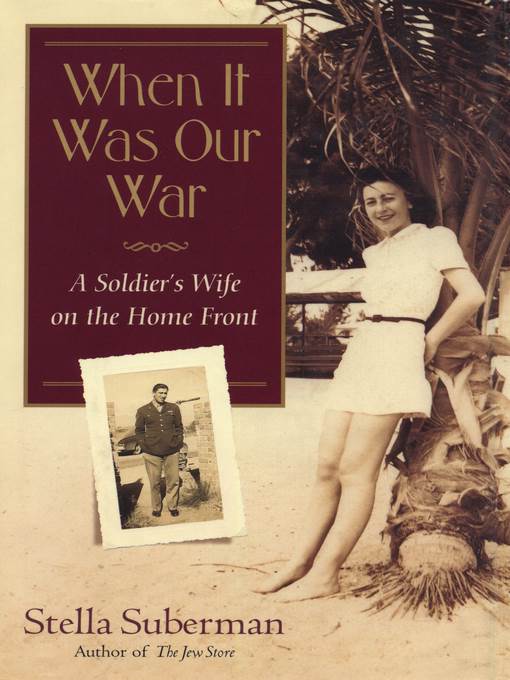
When It Was Our War
A Soldier's Wife on the Home Front
فرمت کتاب
ebook
تاریخ انتشار
2003
Reading Level
6
ATOS
7.5
Interest Level
9-12(UG)
نویسنده
Stella Subermanناشر
Algonquin Booksشابک
9781565129092
- اطلاعات
- نقد و بررسی
- دیدگاه کاربران
نقد و بررسی

Starred review from June 9, 2003
This warm, simple yet artful look at her life as an army officer's wife during WWII, a sequel to Suberman's memoir, The Jew Store,
is the story of a young woman—typical of so many—"who got caught up in a whirlwind and, while she was finding her way about in it, did a lot of growing up." Now 80, Suberman brings a sense of immediacy, tension and even a surprise ending (that will catch your heart) to events that took place more than half a century ago. Before being sent off to battle, Suberman's husband was stationed in California, Arizona and Kansas, and with a novelist's gift for detail and pacing, the author introduces the characters who moved in and out of her life in these locations, among them the anti-Semitic Mrs. Gillis, who inspected young Stella for the "lump" she'd been assured existed on the backs of Jews everywhere; Jerry Bulla, a Mexican-born cadet who passed himself off as Hawaiian to avoid discrimination; and Mrs. Womble, the Subermans' Kansas landlady, who spent her afternoons playing strip poker with the neighborhood ladies. Suberman's narrative retains a calm, even tone, even when her luggage is stolen and she's nearly arrested by a cop who mistakes her for a hooker when he finds her sleeping on a train station bench. And she is equally matter-of-fact about the undercurrent of racism and anti-Semitism that flows through her narrative, showing, without sanctimony, how she eventually confronted her own prejudices and challenged others to confront theirs. (Sept. 26)Forecast:With the recent nostalgia for WWII, this lovely account of wartime on the home front should have broad appeal, which will be helped by a 10-city author tour. This could be a sleeper.

August 1, 2003
As a sheltered teenager in Miami Beach's Jewish community, Suberman (The Jew Store) paid little notice when World War II began. After the bombing of Pearl Harbor, however, the conflict would consume her attention: her boyfriend, Jack, joined the U.S. Army Air Corps, and the two sweethearts soon married. Finding herself a military wife during wartime brought challenge and adventure, which Suberman recalls with enthusiasm and emotional honesty. Her story chronicles not only her homefront sacrifices but also marks her own maturation from na vet to social awareness as Jack was shipped around the country for training. Once Jack was abroad, the couple's correspondence kept their young marriage strong and blended their perspectives so much that Suberman's writing often recounts Jack's overseas experiences as if she had actually been there. She captures the mixed atmosphere of excitement and anxiety as the country braced itself "for the duration." Although an honest and well-written account, this work is similar to the scores of other personal memoirs of the era. Not a necessary purchase but suitable for public libraries.-Elizabeth Morris, formerly of Otsego Dist. P.L., MI
Copyright 2003 Library Journal, LLC Used with permission.

May 1, 2004
Adult/High School-Suberman's first autobiographical work, The Jew Store (Algonquin, 1999), offered readers a portrait of life in the semirural South of her childhood. The story here takes up with her coming-of-age in Florida and her home-front experiences during World War II. The author's Jewish identity didn't mean much to her when she first met her future husband, Jack Suberman, in college. Although he was not religious, he thought deeply and spoke cogently to her about the fact of their Jewishness-what it meant to their peers, what Jim Crow should mean to Jews, and how to reconsider her own prejudices. Marriage and military service happened almost simultaneously for the young couple. Stella traveled to the West to be with Jack as he trained to be a fighter pilot. They had a son. Jack, like some of their friends before him, shipped out to war. Suberman brings a strong and steady voice to this combination memory and unflinching self-analysis. Reflective teens will learn much about human nature's openness to change and moral growth, without feeling themselves confronted by anything akin to preaching. The author's excellent expository style serves as a model, too, for those wanting to create deeper nonfiction collections for high school students.-Francisca Goldsmith, Berkeley Public Library, CA
Copyright 2004 School Library Journal, LLC Used with permission.

September 1, 2003
In the sequel to " The Jew Store" (1998), Suberman carries her autobiography through World War II and marriage to Jack Suberman, her husband for 60 years. They met in Florida, and he exposed her to views on Jewish identity and the race issue that were wholly new to her. More shocks came when war broke out and Jack went into the air force. Following him from base to base, she had to cope with overt anti-Semitism. There were also pregnancy and childbirth, fellow service wives, weird military regulations, and wartime shortages to deal with. Finally, Jack went to fly in B-29s in the China-Burma-India theater, and the emotional impact of Stella's long, rumor-haunted waits for his returns is the greatest the book delivers. Suberman's account of the "Greatest Generation" experience from the viewpoint of those who had to sit it out on the home front will probably be as widely hailed as was " The Jew Store."(Reprinted with permission of Booklist, copyright 2003, American Library Association.)




دیدگاه کاربران